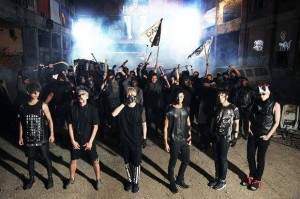
Following leader Bang Yongguk and youngest member Zelo, who announced their departure from TS Entertainment last year, the remaining four members of B.A.P have recently confirmed the non-renewal of their contracts as well, wrapping up B.A.P’s 7-year run as a group. The news comes as no surprise, given TS Entertainment’s poor track record of managing and retaining artists, as well as the exploitative circumstances prompting the lawsuit the members filed back in 2014.
What is perhaps more surprising, and less known, are the lyrical and musical influences they re-introduced to the K-pop scene, the effects of which we continue to see in their hugely popular contemporaries, including BTS and Got7, and in rising groups like Monsta X and Stray Kids. From the moment they debuted, B.A.P carved out a sonic niche, boosted by clever marketing tactics and lyrics that boldly veered away from familiar themes of romantic love.
For sure, B.A.P’s music may not sound all that revolutionary today. But to fully understand what was unique about their sound, it is necessary for us to go back in time for a moment to consider what the K-pop scene was like in 2011, the year leading up to B.A.P’s debut in 2012. Electro-pop and synth-pop were the go-to genres for male groups—think TVXQ‘s “Keep Your Head Down”, Big Bang‘s “Tonight”, and Super Junior‘s “Mr. Simple”. Theatrical dance pop with an emphasis on symphonic flourishes and melodic choruses were also in trend, epitomised by hits like Beast‘s “Fiction” and Infinite‘s “Be Mine”. Rapping was a standard feature, but rarely the centrepiece of title tracks. Predictably, most releases at the time spoke of attraction or heartbreak.
This was the scene that B.A.P broke onto, quite literally—at the beginning of the “Warrior” MV, a figure dressed as Matoki (the group’s mascot) smashes the viewer’s screens as the group launches into their song, a gesture symbolic of the boundaries their music would transcend. With its blazing synths, shrill whistles, Bang Yongguk’s deep, growling voice, Zelo’s rapid-fire rapping, and Daehyun‘s soaring vocals, B.A.P’s musical take on hip hop was decidedly militant. “Warrior” was a deliberate shock to the senses, and whether it was your cup of tea, it was clear that it hit one of the marks of a good debut: it was anything but forgettable.
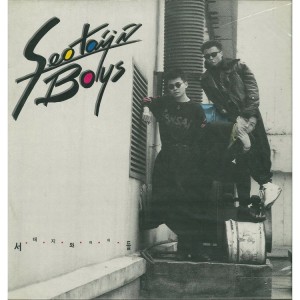
Yet there was more to the novelty of B.A.P’s debut: they brought back to the K-pop scene not just the sound of hip hop, but its socially conscious spirit. They were by no means the first group to engage with this aspect of hip hop; hip hop and K-pop go a long way back. The very beginnings of K-pop can be traced to Seo Taiji and Boys, whose idiosyncratic take on hip hop in the 1990s proved wildly popular with youths, and Deux, a duo also influenced by hip hop. Their success spawned the creation of first-generation idol groups like H.O.T., Sechskies, S.E.S., and Fin.K.L.. Social critiques pervaded the promotional tracks of the hip hop-influenced groups, with songs like Seo Taiji and Boys’ “Classroom Idea” levelling charges at the Korean education system and H.O.T.’s “Warrior’s Descendant” lashing out at bullying.
While hip hop maintained a presence in the early 2000s through artists like Epik High and Leessang, mainstream idol groups tended to favour other genres, especially ballads and dance pop. Socially conscious lyrics resurfaced briefly through TVXQ’s “‘O’-Jung.Ban.Hap” and Super Junior’s “Don’t Don”, and Big Bang’s experimental music fused the sounds of hip hop with pop and R&B. 2PM debuted with a hip hop sound with “10 Out of 10”, but like Big Bang, they were not as interested in the socio-political roots of the genre, and shifted to R&B and dance pop for subsequent releases. So for the most part, the combination of the sound and content of hip hop receded into the background as other trends took over in the latter half of the decade.
It was in this context that B.A.P geared up for their debut, preparing to re-introduce hip hop and its social consciousness to the K-pop world. Bang Yongguk and Zelo’s pre-debut release, “Never Give Up”, gave a sampling of the lyrical content to come:
Taking thousand-dollar private lessons
This system that emphasizes grades over friendships
This pressure called exams
This burden called college
The stress that is building up
Would my parents know?
The lyrics, penned by Bang Yongguk, also held a more personal element:
My dream is to hold a mic and rap
But again, I grab a pen and write down math formulas today
Yeah, things that we learn at school
Are losing dreams and always giving up
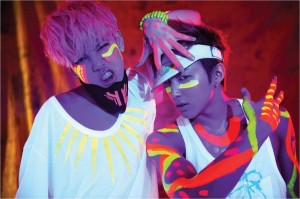
As a group, B.A.P’s lyrics are phrased more broadly, with less targeted critiques, but a similar galvanising tone — “Warrior” is a promise to “fight for the souls in this street” against “hidden system[s]”, while “Power” gestures towards a world with no justice that “surrenders to money” and urges, “Don’t yield in front of them / Don’t do that, lift your head up / We got the power / Stand up against them and fight”. The move to bring back the spirit of hip hop that their seniors in the industry once embodied is a fact the group were conscious of—the title of “Warrior” and its opening line, “Warrior is back”, are likely nods to H.O.T’s “Warrior’s Descendant”. (B.A.P also covered the song twice, for an MCountdown episode in 2012 and the 2016 KBS Song Festival.)
Lyrics aside, B.A.P also reworked hip hop to create their own signature sound; common features included a stomping beat, whistles, an aggressive rap style, and powerful, operatic vocals. These were often interwoven with elements taken from broader dance ballad trends, such as orchestral flourishes, best seen in their dramatic 2013 masterpiece, “One Shot”. Even in “1004 (Angel)”, which is as close to a conventional K-pop dance ballad as the group ever ventured, unexpected touches like blues guitar chords, and the effective pairing of silences with vocal refrains that gain momentum and soar, lent the track the sense of power that characterises many of B.A.P’s title tracks.
The road to realising their musical niche was not, however, without its potholes. After putting out a string of sonically coherent, distinctive releases—”Warrior”, “Power”, and “No Mercy”—the group suffered from conceptual whiplash with “Crash” and “Stop It”, seeing them abruptly shed their aggressive, anti-establishment image and transform into boys swooning in love. Another worrying sign that our writers back then had picked up on was just how over-promoted and overworked the group was.
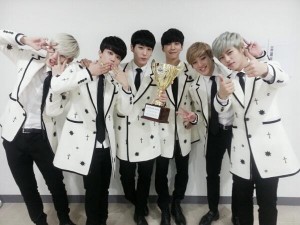
Still, the news of B.A.P’s lawsuit against TS Entertainment in 2014 came as a shock. In a cruel twist of irony, they found themselves living out the struggle their lyrics depicted, fighting against exploitative circumstances, including but not limited to being severely underpaid and forced to work in poor health conditions. From the time of their last proper comeback with “1004 (Angel)” and First Sensibility till they reached a settlement with the company and returned in November 2015, 1 year and 7 months had elapsed—a hiatus long enough to weaken the standing of even A-list K-pop groups. For B.A.P, who had only just begun to see the fruits of their labour—”1004 (Angel)” brought them their first music show win—such a prolonged absence was, needless to say, a severe setback for their career.
BTS, who had debuted a year after B.A.P and were also pursuing the sounds and socially conscious lyrics of hip hop, had been steadily gaining traction in the meantime. It was during B.A.P’s absence that BTS achieved a breakthrough with The Most Beautiful Moment in Life Part 1, securing a leading spot in the ranks of hip hop idol groups. Given this and the sheer length of their hiatus, it was understandably difficult for B.A.P to return fully to this niche and have the same degree of commercial success. Their first comeback after the lawsuit, “Young, Wild, & Free”, pushed a message with underdog vibes similar to “No Mercy”, but musically, it lacked the same punch, despite containing some distinctively B.A.P elements and a noticeably more controlled, mature delivery.
Despite the disadvantageous circumstances surrounding their return to the scene, the group persisted in their musical growth. They ventured into more uptempo, pop territory with “Feel So Good” and “That’s My Jam”; though neither were especially experimental, both were solidly produced and infectiously energetic. They soon followed up with Noir, the best album of their career, returning to a theatrical sound with its title track “Skydive”. Longtime followers of the group would doubtless have been heartened by “Wake Me Up”, a subtle return to their socially conscious beginnings, but with a more refined sound incorporating electronic beats, beautiful hooks, and falsetto vocalisations for a stirring, dramatic track.
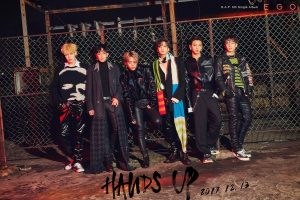
Although B.A.P’s final title tracks, “Honeymoon” and “Hands Up”, didn’t quite meet the standard of their earlier releases, an overview of their discography from debut to date reveals that they’ve already left their mark on the industry. Their lawsuit and long hiatus may have held them back from achieving a level of commercial success on par with their potential, but their music rarely succumbed to trends. Their earlier tracks, especially, drew attention to the possibilities and value of a hard-hitting, anthemic, rap-forward, yet strongly melodic sound.
While it’s hard to assert that B.A.P had a direct influence on later groups, their debut clearly signalled the revival of K-pop’s interest in hip hop, and the beginning of experimentations with a heavier, more aggressive soundscape. BTS would take the renewed interest in the social consciousness of hip hop in a more culturally specific direction, pursuing a cleaner sound initially before weaving in rock influences; Got7 drew heavily from hip hop street styling and beats in their early releases, but pursued a more playful, pop-laced sound. Monsta X’s discography recalls B.A.P’s blend of aggressive rapping with soaring melodies, working in contemporary trends in EDM to produce their own signature sound.
Even as B.A.P’s future as a group remains up in the air with their contract non-renewals and Bang Yongguk and Himchan‘s impending enlistment, the end of this chapter of their career is also a sign of new beginnings. Bang Yongguk, in particular, is already a step ahead with the gutting pre-release, “Hikkomori”, and his first full album, BANGYONGGUK, due out on March 15. If the other members can find a similar artistic freedom—one that TS Entertainment never fully granted them—while still holding tight to their previous drive to find their own sound and voices, the possibilities that await them will be, indeed, as powerful as their music.
(YouTube. TheBiasList. Lyrics via Popgasa. Images via TS Entertainment.)


